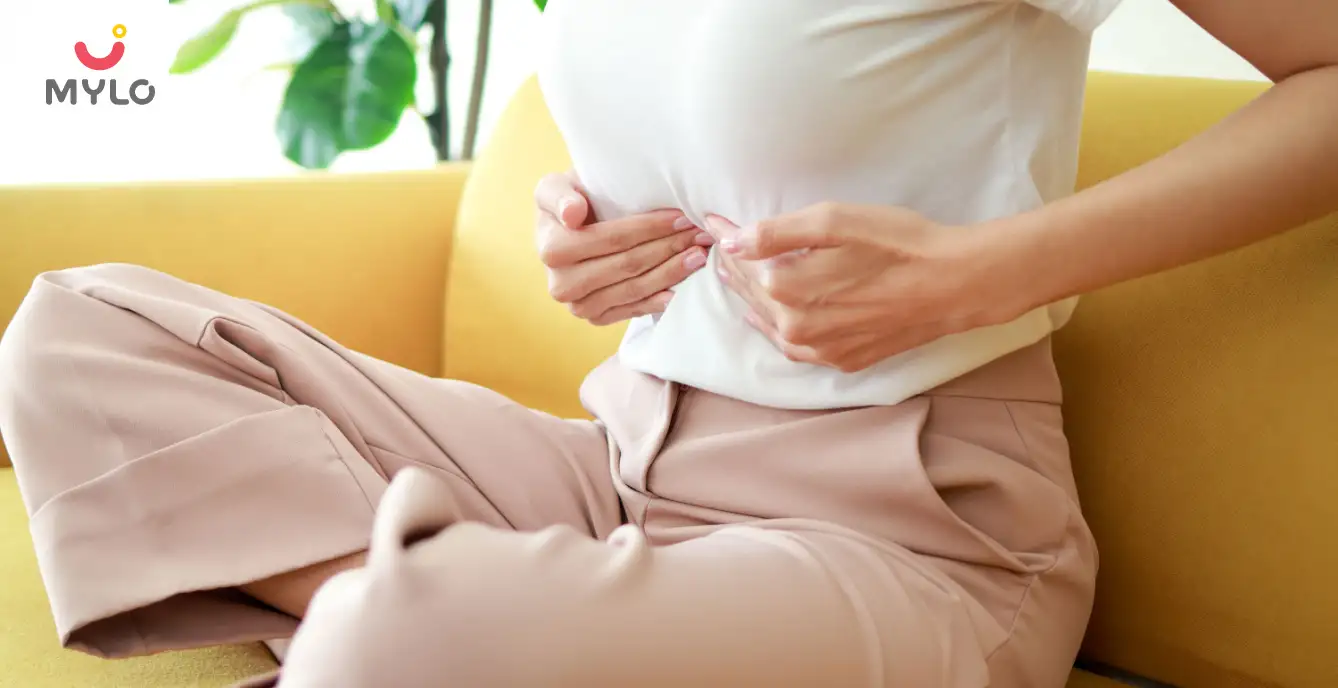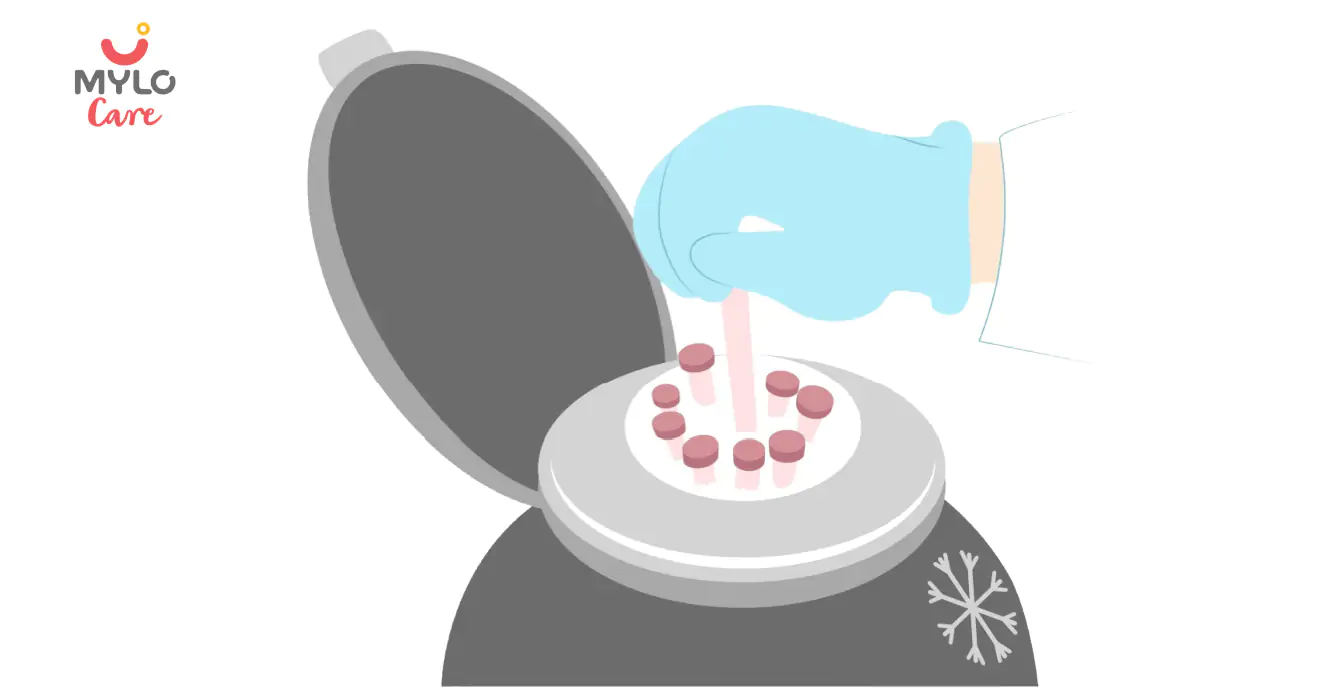- Home

- Conception

- How to Self Examine Your Stomach for Pregnancy?
In this Article
Conception
How to Self Examine Your Stomach for Pregnancy?
Updated on 26 March 2024
If you have just found out that you are pregnant and are wondering how stomach feels in early pregnancy, then you are not alone. Pregnancy invokes a heightened sense of curiosity, where you become more conscious about your body changes. Most women are eager to know about the early signs of pregnancy, and how to self examine your stomach for pregnancy.
Early pregnancy detection helps the lady mentally prepare for the big event and accordingly make better choices in diet and lifestyle. In this article, we will explore all the facts regarding how does your lower stomach feel in early pregnancy.
What are the Initial Signs of Pregnancy?
The egg's successful fertilization is warmly celebrated by the body as the hormones start dancing and bring many physiological changes. Missing your period is often the first notable sign of pregnancy which may be followed by early pregnancy symptoms like sore breasts, cramps, bloating, and fatigue. Some women also complain of increased urination, nausea, and increased sense of smell.
There are a lot many ladies who feel no different, while some others say it's hard to tell whether these symptoms are due to PMS (premenstrual syndrome) or pregnancy. To avoid confusion, knowing how to check your stomach for early pregnancy can be handy.
How Stomach Feels in Early Pregnancy?
If you are struggling to understand how does your lower stomach feel in early pregnancy, then scan the below lines and let the mystery unfold. You may observe some of the changes like:
1. Mild cramping
Your early pregnancy bump is not really a bump and only you can notice the difference. The reason is abdominal bloating and cramping in the early pregnancy which might make it feel slightly fuller than usual. The abdominal cramps are the same as period cramps and the process is regarded as implantation cramping. These cramps are usually felt when the fertilized egg attaches itself to the uterine lining.
2. Bloating
A few moms-to-be report that their tummy feels soft but a bit bigger than usual. Bloating makes your tummy expand a little like it happens before a period or after a scrumptious meal. Additionally, women may experience a feeling of fullness as the uterus expands and begins to exert pressure on the surrounding organs.
3. Twinges and Pulling Sensations
In early pregnancy, some women experience a random pulling sensation from inside or a sharp pain as the supporting ligaments stretch and remodel themselves.
You may also like: Ways to perform a natural pregnancy test at home without using a pregnancy test kit
Why is Self-Examination a Good Option?
The sure shot way to confirm your conception is through a pregnancy test kit, but at times you might not have access to self-testing kits. While lying in your bed you might wonder how does your lower stomach feel in early pregnancy. Then one of the best options is to understand how to self examine your stomach for pregnancy.
Self-examination offers many benefits ranging from increased awareness about your body to incorporating healthy diet and lifestyle choices. This technique enables you to identify the early signs and can help you make informed decisions for a brighter future. Having said that, it is essential to remember that self-examination is not a substitute for pregnancy tests or medical advice. If you think you are expecting, then it is best to consult your healthcare provider at the soonest.
How do you feel your uterus in early pregnancy is a common concern. Feeling the uterus by examining your stomach has been practised traditionally to self-test for pregnancy. It is one of the early signs of pregnancy as the uterus is making room for the developing fetus which can be called a little bump in your abdomen. An important thing to remember is that it is hard to notice during the early stages.
The uterus becomes more evident when it grows out of the pelvis, but again you must know its location and how it feels otherwise. If you are expecting, you can anticipate a firmer abdomen as the expanding uterus puts pressure on the surrounding organs. A usual touch on your tummy might not be able to provide you with any confirming details. Knowing about how stomach feels in early pregnancy is more effective after you enter your second trimester.
You may also like: After how many days of sex can you check for pregnancy?
How to Check Your Stomach for Early Pregnancy?
The right way to check pregnancy by examining your stomach includes locating the hard, developing uterus. So, if you want to know how to feel your uterus in early pregnancy, you can follow these steps:
-
It is essential to follow the correct protocol if you are looking for the answer of how do you feel your uterus in early pregnancy. You can locate your developing uterus by following the below-mentioned steps:
-
Before the self-examination process, it is essential to empty your bladder.
-
The ideal position is one where you are lying on your back with your knees bent and your feet should be placed flat on the bed.
-
Inhale slowly and deeply and relax. You must remain calm as the process gives more accurate results with a stress-free mindset.
-
Keep your fingers towards the right while your elbows are pointing towards the left, place the flat side of your left hand at the centre of your tummy, exactly above and near the pubic bone.
-
Place your right hand over the pubic bone where your fingers are positioned towards the bone and your left palm offers support to your belly.
-
Examine as your fingers are gently moving over your tummy while you softly push your feet.
-
You may feel a semi-firm ball that is a little firm and is unlike your bowels. You can find the apex of the uterus just behind the pubic bone.
-
Don’t try too hard if you are unable to feel your womb even after a few attempts. Have patience and wait for some time till the womb rises above the pelvic cavity.
What Could Be the Reason You Couldn’t Feel Your Uterus?
Even after following all the steps carefully, chances are you may not hit the bullseye, while you are exploring how to feel your uterus in early pregnancy. One of the biggest reasons is that your uterus might be still very small to become identifiable during palpation, especially during the initial few weeks.
Besides that, if your uterus prefers the tilted position then also the stakes are high that you may miss it while self-examining. Also, excessive body fat, gas or bloating and incorrect technique can contribute to the challenges. You must consider that self-examination can never replace a medical pregnancy test and it is always recommended to consult your doctor at the earliest.
Conclusion
Pregnancy is a beautiful journey in which learning about the initial changes and early interventions can go a long way in making more informed decisions. Learning how to self examine your stomach for pregnancy can prove effective in identifying early pregnancy and seeking timely antenatal care. This method can be more accurate if performed by following all the necessary steps. Self-examination is a no-harm technique to check for early pregnancy however, it cannot replace the medical pregnancy test kits or seeking expert guidance. If you are anticipating conception, it is a good time to see your gynecologist.
References
1. Soma-Pillay P, Nelson-Piercy C, Tolppanen H, Mebazaa A. (2016). Physiological changes in pregnancy. Cardiovasc J Afr. NCBI
2. Bachmann GA. Myth or fact: can women self-diagnose pregnancy? (1984). J Med Soc N J. NCBI
Tags
How to Self Examine Your Stomach for Pregnancy in Bengali, How to Self Examine Your Stomach for Pregnancy in Tamil, How to Self Examine Your Stomach for Pregnancy in Telugu



Written by
Madhavi Gupta
Dr. Madhavi Gupta is an accomplished Ayurvedic doctor specializing in Medical content writing with an experience of over 10 years.
Read MoreGet baby's diet chart, and growth tips

Related Articles
Related Questions
Hello frnds..still no pain...doctor said head fix nhi hua hai..bt vagina me pain hai aur back pain bhi... anyone having same issues??

Kon kon c chije aisi hai jo pregnancy mei gas acidity jalan karti hain... Koi btayega plz bcz mujhe aksar khane ke baad hi samagh aata hai ki is chij se gas acidity jalan ho gyi hai. Please share your knowledge

I am 13 week pregnancy. Anyone having Storione-xt tablet. It better to have morning or night ???

Hlo to be moms....i hv a query...in my 9.5 wk i feel body joint pain like in ankle, knee, wrist, shoulder, toes....pain intensity is high...i cnt sleep....what should i do pls help....cn i cosult my doc.

Influenza and boostrix injection kisiko laga hai kya 8 month pregnancy me and q lagta hai ye plz reply me

RECENTLY PUBLISHED ARTICLES
our most recent articles

Common Health Problems
Navel Displacement: The Ultimate Guide to Causes, Symptoms & Treatment

TV & OTT
Top 10 Thriller Movies on Hotstar for Edge-of-Your-Seat Excitement

TV & OTT
10 Best Pakistani Dramas of All Time

Ear Infection During Pregnancy: Understanding the Risks and Remedies

Male Infertility
Freezing Sperm: Preserving the Possibility of Parenthood

Baby Massage
The Ultimate Guide to Ghee Massage for Babies
- Sunflower Seeds in Pregnancy: Advantages, Risks, & Recipes
- The Ultimate Guide on Cabbage During Pregnancy Benefits and Precautions
- Double Marker Test: Everything You Need to Know for a Healthy Pregnancy
- The Pros and Cons of Consuming Brinjal in Pregnancy
- Why You Should Consider Drinking Coconut Water During Pregnancy?
- Sneezing During Pregnancy: Causes, Risks and Treatment
- Comfort vs. Style: The Pros and Cons of Wearing Heels During Pregnancy
- A Mom-to-Be's Handbook to Safely Savoring Momos in Pregnancy
- Chicken During Pregnancy: The Ultimate Guide to Safe and Nutritious Eating
- How To Prepare Food For Your Infant/Toddler Safely? Here Are Some Tips That You Must Not Forget While Preparing Food
- Lactational Amenorrhea Method: A Safe and Effective Contraception for Postpartum Moms
- What to Do to Help Fall Asleep Faster During Pregnancy?
- Home Remedies to Control High Blood Pressure in Pregnancy
- Pizza During Pregnancy: Cravings, Comfort, and Caution for Moms-To-Be


AWARDS AND RECOGNITION
Mylo wins Forbes D2C Disruptor award
Mylo wins The Economic Times Promising Brands 2022
AS SEEN IN
















At Mylo, we help young parents raise happy and healthy families with our innovative new-age solutions:
- Mylo Care: Effective and science-backed personal care and wellness solutions for a joyful you.
- Mylo Baby: Science-backed, gentle and effective personal care & hygiene range for your little one.
- Mylo Community: Trusted and empathetic community of 10mn+ parents and experts.
Product Categories
baby carrier | baby soap | baby wipes | stretch marks cream | baby cream | baby shampoo | baby massage oil | baby hair oil | stretch marks oil | baby body wash | baby powder | baby lotion | diaper rash cream | newborn diapers | teether | baby kajal | baby diapers | cloth diapers |









